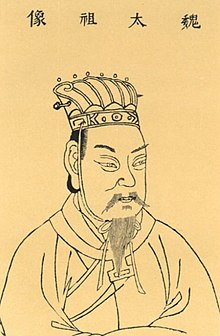 Global Information
Global InformationCao Cao information
| Cao Cao 曹操 | |||||||||||||
|---|---|---|---|---|---|---|---|---|---|---|---|---|---|
 A Ming dynasty illustration of Cao Cao in the Sancai Tuhui. | |||||||||||||
| King of Wei | |||||||||||||
| Tenure | 216 – 15 March 220 | ||||||||||||
| Successor | Cao Pi | ||||||||||||
| Duke of Wei (魏公) | |||||||||||||
| Tenure | 213–216 | ||||||||||||
| Imperial Chancellor | |||||||||||||
| Tenure | 208 – 15 March 220 | ||||||||||||
| Successor | Cao Pi | ||||||||||||
| Minister of Works | |||||||||||||
| Tenure | 196–208 | ||||||||||||
| Born | c. 155 Qiao County, Pei state, Han dynasty | ||||||||||||
| Died | 15 March 220 (aged 64–65) Luoyang | ||||||||||||
| Burial | 11 April 220 Cao Cao Mausoleum | ||||||||||||
| Spouse |
| ||||||||||||
| Issue (among others) |
| ||||||||||||
| |||||||||||||
| Father | Cao Song | ||||||||||||
| Mother | Lady Ding | ||||||||||||
| Cao Cao | |||||||||||||||||||||||||||||||||
|---|---|---|---|---|---|---|---|---|---|---|---|---|---|---|---|---|---|---|---|---|---|---|---|---|---|---|---|---|---|---|---|---|---|
"Cao Cao" in Chinese characters | |||||||||||||||||||||||||||||||||
| Chinese | 曹操 | ||||||||||||||||||||||||||||||||
| |||||||||||||||||||||||||||||||||
Cao Cao (ⓘ; [tsʰǎʊ tsʰáʊ]; Chinese: 曹操; c. 155 – 15 March 220),[1] courtesy name Mengde, was a Chinese statesman, warlord, and poet who rose to power during the end of the Han dynasty (c. 184–220), ultimately taking effective control of the Han central government. He laid the foundation for what was to become the state of Cao Wei (220–265), established by his son and successor Cao Pi, who ended the Eastern Han dynasty and inaugurated the Three Kingdoms period (220–280). Beginning in his own lifetime, a corpus of legends developed around Cao Cao which built upon his talent, his cruelty, and his perceived eccentricities.
Cao Cao began his career as an official under the Han government and held various appointments, including that of a district security chief in the capital and the chancellor of a principality. He rose to prominence in the 190s during which he recruited his own followers, formed his own army, and set up a base in Yan Province (covering parts of present-day Henan and Shandong). In 196, he received Emperor Xian, the figurehead Han sovereign who was previously held hostage by other warlords such as Dong Zhuo, Li Jue, and Guo Si. After he established the new imperial capital in Xuchang, Emperor Xian and the central government came under his direct control, but he still paid nominal allegiance to the emperor. Throughout the 190s, Cao Cao actively waged wars in central China against rival warlords such as Lü Bu, Yuan Shu, and Zhang Xiu, eliminating all of them. Following his triumph over the warlord Yuan Shao at the Battle of Guandu in 200, Cao Cao launched a series of campaigns against Yuan Shao's sons and allies over the following seven years, defeated them, and unified much of northern China under his control. In 208, shortly after Emperor Xian appointed him as Imperial Chancellor, he embarked on an expedition to gain a foothold in southern China, but was defeated by the allied forces of the warlords Sun Quan, Liu Bei, and Liu Qi at the decisive Battle of Red Cliffs.
His subsequent attempts over the following years to annex the lands south of the Yangtze River never proved successful. In 211, he defeated a coalition of northwestern warlords led by Ma Chao and Han Sui at the Battle of Tong Pass. Five years later, he seized Hanzhong from the warlord Zhang Lu, but lost it to Liu Bei by 219. In the meantime, he also received many honours from Emperor Xian. In 213, he was created Duke of Wei and granted a fief covering parts of present-day Hebei and Henan. In 216, he was elevated to the status of a vassal king under the title "King of Wei" and awarded numerous ceremonial privileges, of which some used to be reserved exclusively for emperors. Cao Cao died in Luoyang in March 220 and was succeeded by his son Cao Pi, who accepted the abdication of Emperor Xian in November 220 and established the state of Cao Wei to replace the Eastern Han dynasty— an event commonly seen as a usurpation. This marked the transition from the Eastern Han dynasty to the Six Dynasties period. After taking the throne, Cao Pi granted his father the posthumous title "Emperor Wu" ("Martial Emperor") and the temple name "Taizu" ("Grand Ancestor").
Apart from being lauded as a brilliant political and military leader, Cao Cao is celebrated for his poems, which were characteristic of the Jian'an style of Chinese poetry. Opinions of him have remained divided from as early as the Jin dynasty (265–420) that came immediately after the Three Kingdoms period. There were some who praised him for his achievements in poetry and his career, but there were also others who condemned him for his cruelty, cunning, and allegedly traitorous ways. In traditional Chinese culture, Cao Cao is stereotypically portrayed as a sly, power-hungry, and treacherous tyrant who serves as a nemesis to Liu Bei, often depicted in contraposition as a hero trying to revive the declining Han dynasty. During the Ming dynasty (1368–1644), when Luo Guanzhong wrote the epic novel Romance of the Three Kingdoms, which dramatises the historical events before and during the Three Kingdoms period, he not only cast Cao Cao as a primary antagonist in the story, but also introduced, fictionalised, and exaggerated certain events to enhance Cao Cao's "villainous" image.
- ^ de Crespigny (2007), pp. 35, 38.